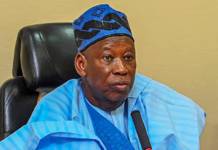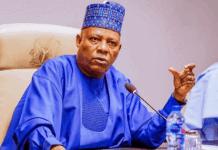The Federal Government, Tuesday, appealed to the Nigeria Labour Congress (NLC) to rescind its opposition to the registration of two new academic unions in the Nigerian public university system.
Recall that the new unions – the Congress for Nigerian University Academics (CONUA) and the Nigeria Association of Medical and Dental Academics (NAMDA) – received letters of recognition recently during a ceremony at the Federal Ministry of Labour and Employment in Abuja.
However, in a letter to the Minister of Labour and Employment, Sen. Chris Ngige, the President of NLC, Comrade Ayuba Wabba, demanded for the withdrawal of the letters issued to the unions, on the grounds that their registration contravened the laws guiding trade unionism.
In his reply, dated October 12, 2022, Ngige appealed to NLC to allow the new unions to exist in the spirit of Freedom of Association.
He insisted that the Trade Dispute Act 2004 gives him the sole power to register new trade unions, either by registering a new union or regrouping existing ones.
In a statement signed by the head of the press and public relation, Olajide Osundun yesterday, the minister reiterated that the new unions were offshoots or by-products of regrouping and their applications were considered by two committees of his ministry, with the Registrar of Trade Unions participating when the first recommendation for approval was given in 2019, and again in 2022.
He explained that CONUA and NAMDA were regrouped from the Academic Staff Union of Universities (ASUU), for efficiency and effectiveness in the system and more importantly, to protect these groups of university teachers whose worldview differs from the restive parent union.
Ngige said, “Comrade President, do not unnecessarily oppose the registration of these new academic unions because with ASUU, they are all like seeds on the academic soil of Nigeria and which will grow into big trees we don’t know, but the one which her trees are not bearing good fruits, we already know. So, as an uncle of the unions, oppose none in the spirit of Freedom of Association.
“It should be noted that Section 3 (2) of the Trade Dispute Act, CAP T14 gives the Honourable Minister of Labour and Employment, the sole power to register new trade unions, either by registering new trade union or regrouping existing ones. This matter was a subject of litigation in the National Industrial Court of Nigeria (NICN) in most recent case which the President of the NLC failed to mention in his narration of court cases – the case of the Nigerian Union of Pensioners (NUP) and the regrouped Federal Parastatals & Private Sector Pensioners Association of Nigeria (FEPPAN) from NUP where the Law on Regrouping of Trade Unions was extensively explored and ruled upon, unlike the cases cited by the President of the NLC to misinform the general public and unfortunately lead astray his affiliate Trade Union – ASUU. “
He recalled that the NICN in a Suit no. NICN/ABJ/219/2019, buttressed its earlier ruling on the matter and which had stated inter alia that the power to register trade unions resides with the Minister of Labour and Employment.
He noted that the last segment of Section 3(2) does not refer to the regrouping of existing trade unions, hence, the differentiation within the section between registering a new trade union and regrouping existing ones.
Ngige further submitted, “We note your reference to Section 5 of the same Act, which deals with the “Procedure on receipt of application for registration” of a Trade Union. Section 5(4) in Particular states that the Registrar shall not register a trade union if it appears to him that any existing trade union is sufficiently representative of the interests of the class of workers concerned – CONUA members were ostracised and de-unionised by ASUU. Do we as the Competent Authority on Labour matters, including trade union services, pay homage to ASUU and acquiesce to leaving a large segment of lecturers and academia un-unionised, without protection, without a voice, and without a right at work. Are these workers not covered by the same ILO Conventions nos. 87 & 97?”
Regarding NAMDA, he said they are medical doctors lecturing in the universities who are bound by their professional ethics and Hippocratic oath to “first do no harm” to all and as such, were against the incessant prolonged and illegal strikes by ASUU, which had disrupted medical training and caused consequential damages to the educational system and by implication, the quantity and quality of future medical doctors and dentists in Nigeria.
“They have been teaching and some have graduated their students since the 8-month old strike by ASUU which commenced on Feb 14 2022. Universities of Maidugri, Bauchi and Sokoto medical teachers are indeed patriots. Moreover, their peculiar needs are quite different from the rest of ASUU members and they are often left out on welfare and career progression in the universities – the core functions of a registered trade union.”
Ngige told the NLC President to desist from using his position to deceive the general public by misguiding them with mal-citations of Labour Authorities.
“President, NLC, you know and will admit that the Honourable Minister of Labour and Employment is a full blown active member of ILO who have brought Nigeria back from 10 years absence and oblivion into the Governing Board since 2016 when he made his first appearance at the ILO Governing Body meeting. He was President of the 187 country Government group and even spokesman Africa group, and is in a very good position to know that “full democratisation” of Trade Unions and even Federations is where the world has gone.”
“Neighbouring Ghana and South Africa have multifarious trade Unions in academics while South Africa has four federations or labour centres instead of Nigeria’s two federations – NLC and Trade Union Congress (TUC), even though Nigeria’s workers’ population is about three times that of South Africa.”
He advised Wabba to review and align appropriately, the cases cited by him on the matter and desist from misinformation that may lead to irreparable damages, as leadership is a double-edged weapon.
He noted that if the argument canvassed by NLC was strictly followed, then ASUU, an association of senior staff in Nigerian universities, should belong to Trade Union Congress (TUC), entitled to organise staff in labour space.
Ngige pointed out that the Academic Staff Union of Research Institutions (ASURI), cited by the NLC President, used to be part of the Senior Staff Association of Universities Teaching Hospitals, Research Institutes and Associated Institutions (SSAUTHRAI) and was a product of regrouping on August 13, 2013.
He identified, among other products of regrouping, the Senior Staff Union in Colleges of Education (SSUCOEN), Senior Staff Association of Nigerian Polytechnics (SSANIP), registered on September 30, 2009, and the Senior Staff Association of Nigerian Universities recognised in 2005 and its by-product, the Natioonal Association of Academic Technologists.
He added, “Mr. President, NLC, if ASUU feels aggrieved, they could approach the Courts for Judicial remedy as law abiding citizens just like the Federal Government (FG) through Federal Ministry of Labour & Employment, by virtue of the powers conferred by Section 17 of the TDA, transmitted the FG/ASUU trade dispute to the NICN for adjudication, due to refusal of the union to comply with the provisions of Section 18 of the TDA, conciliation having failed.”

























